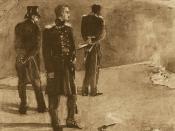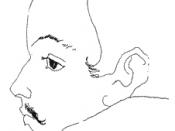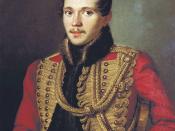"Fate and Will": Pechorin
It is very important to remember the significance of Pechorin's struggle not only with social conventions, but also with concepts of fate and will. The context in The Fatalist provides the reader with the greatest significance of the confrontation between the opposing philosophies surrounding fate and will.
Pechorin throughout the story is testing against his own existence, testing to see whether he can find any justification for his actions in the context of predestination, and he concludes, in The Fatalist that human existence is indeed determined by fate. This goes against one of the most basic principles of the ideal romantic hero that I have read about in Russian Literature. Pechorin needs other people, is ruled by fate, and follows not his emotions but his own twisted reasoning, which drives him out of society. A good comparison, which I thought when I was reading A Hero Of Our Time, was that it could be viewed as a drama, with Pechorin as the stage manager.
During The Fatalist it is not Pechorin who controls the scene and puts himself in center stage, rather it is Vulich. Pechorin is not use to being in the background and expresses this discomfort by describing Vulich as having some mysterious power over us. Another example is when Lermontov shows Pechorin's inability to control the story when he tells Vulich that he is going to die today, but he doesn't die. This sudden shift in Pechorin's role in the novel should make us doubtful of Pechorin's purpose. After this shift, I wondered why Pechorin would take himself out of the center of stage. I found the answer in The Fatalist when the story begins about fate. Towards the end of the story, I realized how many people's deaths are connected to...


